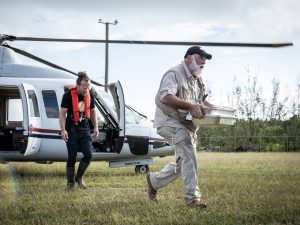summit
Food – and a New Generation of Leaders – Could Change the World

In my line of work, feeding people around the world, you cannot ignore the fact that our global food systems are broken. Rampant hunger and poverty, deteriorating public health and nutrition, a rising epidemic of diet-related diseases, and systemic inequities that put these problems on the shoulders of those who’ve been historically on the margins. A climate crisis that is getting worse and worse and putting the very ingredients of our culinary heritage – avocadoes, blueberries, coffee, paprika! – at risk of extinction.
It is easy to be overwhelmed by the problems. But, if you know me, you may have heard me say that food is not the problem – it is the solution! Food is how we change the world – it nourishes us all, is central to our global economy, and inspires new tools and technology – but it can only do so if we take bold, courageous, collaborative steps to reshape what’s broken. And who better to create the solutions we need for the future than the next generation of food fighters?
This is what we are doing at the new Global Food Institute at the George Washington University, one of my newer projects that took flight earlier this year. It will not be a place for just thinking or talking, but a place for uniting, inspiring, empowering, and acting. A place to look at all of the ways food relates to policy, innovation, and humanity.
How do we think and act differently to address these challenges more holistically? By looking at everything through the lens of food. How do we re-envision nutrition as a part of health? By integrating it into the education of doctors and medical professionals. How do we embed sustainable, regenerative practices into food production and our school meal system? By working with future farmers, teachers, food business leaders, and school administrators to develop them. How does food stop being a policy afterthought? We nurture future lawyers, politicians, and advocates to drive change and shape policies with food at the forefront.
The Global Food Institute will succeed because it is built on the principle of breaking down silos and bringing the impact of food into conversations across all of GW’s schools and colleges, with motivated students and a world-class faculty at the heart of cutting-edge research and innovation. And because we cannot just talk to ourselves, we will convene industry leaders, policymakers, and renowned experts leading vital conversations to help tackle the biggest challenges we see.
In 2021, I was humbled and honored to receive the first-ever Courage and Civility Award from Jeff Bezos. To this day, that award serves as a daily reminder that courage is not the absence of fear but the audacity to envision the world we want. A world where our food systems do not perpetuate inequality but where every dish tells a story of our resilience, every bite is a celebration of our shared humanity, and feeding our neighbors is a shared responsibility of being a global citizen.
In my travels around the world – whether developing dishes to open a new restaurant or providing nourishing meals in disaster zones with my humanitarian relief nonprofit World Central Kitchen – I am reminded of the power of food to enrich lives, build bridges, and heal communities. But too often, there seems to be a disconnect between the inspiring people and solutions I encounter on the ground, and our collective capacity to create change from within the world’s most powerful institutions and governments. To meet the unprecedented challenges to feed and heal a planet that is increasingly hungry and sick, we must stop throwing money at the problem – and begin investing into smart solutions and proven policies that empower meaningful progress.
To transform our food system, we must instill that courage in the next generation, along with the knowledge and tools to use food to heal ourselves, our neighbors, and our planet. We are only at the beginning, and I hope you will join us on the journey.
